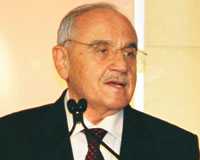 Turkey has insisted that a planned NATO anti-missile system should not be perceived as a threat against any of its eastern neighbors with which its economic and political relations have particularly flourished in the last few years, while US authorities called on Ankara to approve hosting a part of the Europe-wide shield.
Turkey has insisted that a planned NATO anti-missile system should not be perceived as a threat against any of its eastern neighbors with which its economic and political relations have particularly flourished in the last few years, while US authorities called on Ankara to approve hosting a part of the Europe-wide shield.
Speaking at panel discussions held as part of the two-day 29th Annual American-Turkish Council (ATC) Conference in Washington on Monday, Turkish Minister of Defense Vecdi Gönül and US Defense Secretary Robert Gates both said the talks over the proposed missile shield are continuing on the basis of mutual trust and dialogue as two allies. “Contrary to some press reports, we are not pressuring Turkey to make a contribution. But we do look to Turkey to support NATO’s adoption at the Lisbon summit of a territorial missile defense capability,” Gates said, addressing the high-profile audience of politicians and businessmen from both sides on Monday in the US capital.
Amid these calls from the US for approval, Turkey is particularly seeking guarantees from the West for the system not to be perceived as an anti-Iran or anti-Russia move while also trying to reduce the cost of a national anti-missile shield by agreeing to host a part of it at the NATO’s Lisbon summit next month.
Gönül underlined that Ankara in principle supports the idea of the anti-missile system but said it should counter the full range of ballistic missile threats. Turkish Foreign Minister Ahmet Davutoğlu said recently that Turkey does not perceive any threat from any neighboring countries and does not think its neighbors present a threat to NATO, either. The transatlantic alliance, on the other hand, says the system is intended to defend all its members against possible missile attacks by “rogue states.” NATO operates by consensus and needs approval of its 28 members for the proposed system to be put into practice. Earlier, Gönül also underlined that his government was seeking an agreement on technical issues, including how the NATO-wide shield system would affect Turkey’s national missile system and if it would cover the entire country as well.
Gönül and Gates were the luncheon speakers on Monday.
On the sidelines of a panel discussion the same day, US Assistant Secretary of Defense for International Security Affairs Alexander Vershbow however — without naming the missile defense issue outright — called on Ankara to “demonstrate publicly” that bilateral and NATO alliance relations were moving forward. He made references to Turkey’s refusal of a new round of UN sanctions against Iran and also its tense relations with Israel but assessed the issues in the context of the run-up to the Lisbon summit.
“Unfortunately, Turkey’s statements and actions last spring regarding Israel and Iran have contributed to a political environment in which it may be more difficult to move forward, at least in the short term, on some important projects that the administration supports. … With a historic NATO summit just a month away, we should seize the opportunity to publicly demonstrate our commitment to one another,” Vershbow said. A US defense official, speaking on condition of anonymity with Reuters, later clarified that the projects Vershbow had referred to were the sale of pilotless drone aircraft to Turkey.
Also delivering speeches at the event on Monday, two leading diplomats from both sides gave rather positive messages as to the strength of the alliance between their countries though they sometimes differ on certain issues. While Philip Gordon, the US assistant secretary of state for Europe and Eurasian affairs, said Turkey and the US had a very close and active dialogue in foreign policy and also had common interests within NATO, Turkish Foreign Ministry Undersecretary Feridun Sinirlioğlu maintained that “the two countries can have different approaches on some issues but we should always remember that we have a common goal.” The same views were reiterated by Turkish Deputy Prime Minister Ali Babacan as well.
“Disagreements are embedded in the nature of all healthy relations. If there aren’t any, then it means that someone is being intimidated in that relationship. Therefore, we try to develop a healthy relationship with the US while always keeping in mind our common goals and values,” he said.
Turkish Foreign Trade Minister Zafer Çağlayan also took the floor at the event on Monday and touched upon Turkey’s adherence to UN sanctions against Iran, though it voted against them at the UN Security Council meeting in June. However, stressing that the sanctions should not overstep defined boundaries and hamper Turkey’s trade with Iran in the areas that are not subject to them, Çağlayan said Turkey’s share in Iran’s imports is very minimal. “Now I am asking: Iran had an import volume of $66 billion last year. Of this, Turkey’s share was only $2 billion. So, who made up the remaining $64 billion in exports to Iran? This needs to be discussed,” he said. In his speech, Çağlayan also touched upon “non-developing” economic relations with the US. “While the world economy is advancing, as are Turkey’s exports and foreign trade, we haven’t see even a tiny improvement in trade with the US,” he noted.
20 October 2010, Wednesday
TODAY’S ZAMAN WITH WIRES İSTANBUL

Leave a Reply